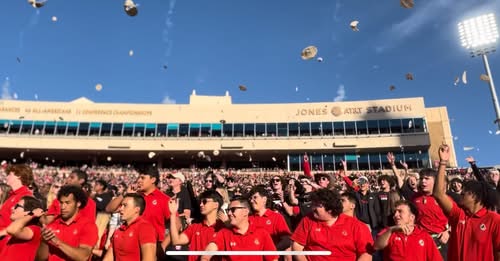Texas Tech University has long been known for its resilient athletic programs, and its storied tradition in college sports is something that the Red Raiders hold dear. Recently, Texas Tech Athletic Director Kirby Hocutt made a statement that has resonated deeply within the college sports community: “Red Raiders, the rules can change. But our tradition will not.” This simple yet powerful declaration encapsulates the tension many programs feel in an era where college athletics are undergoing rapid transformations. From evolving NCAA regulations to the explosion of the Name, Image, and Likeness (NIL) era, college sports have never faced as many shifting landscapes. Hocutt’s statement underscores a commitment not just to compete, but to preserve the essence of what it means to be a Red Raider in an era of unprecedented change.
At its core, Hocutt’s message is about identity and continuity. College athletics is more than wins and losses; it’s about the culture, the legacy, and the values that programs instill in athletes and fans alike. For Texas Tech, this has meant fostering a sense of pride that extends beyond the gridiron or the basketball court. Red Raiders fans are fiercely loyal, and the athletic department under Hocutt has often emphasized the importance of maintaining a connection between past and present. Whether it’s honoring legendary coaches, celebrating historic moments, or ensuring that current athletes understand their role in a larger tradition, Texas Tech has consistently prioritized the intangible aspects of its programs alongside competitive success. In saying that rules can change but tradition cannot, Hocutt highlights a vision where the essence of the program—the spirit, the camaraderie, the values—is untouchable even as regulations and external pressures evolve.
One major area where the tension between tradition and rules is visible is the NIL landscape. The introduction of Name, Image, and Likeness rights for student-athletes has revolutionized college sports, creating opportunities for athletes to monetize their personal brands. While this is an exciting development for players who can now benefit financially from their talents, it also introduces challenges for programs trying to maintain a cohesive team culture and uphold traditional values. Hocutt’s declaration seems to acknowledge these challenges, emphasizing that while the financial and legal frameworks surrounding college sports may shift, the principles that define Texas Tech athletics—commitment, teamwork, integrity—remain constant. This is a delicate balance, requiring administrators to embrace new opportunities without compromising the culture that has defined the Red Raiders for decades.
The issue of changing rules extends beyond NIL. The NCAA has been actively revising eligibility requirements, transfer policies, and scheduling regulations in response to the evolving needs of student-athletes and the pressures of modern collegiate sports. Transfer portal rules, for instance, have made it significantly easier for athletes to move between programs, creating both opportunities and potential disruptions. Programs now must navigate roster volatility and potential talent loss while still instilling loyalty and team cohesion. In this context, Hocutt’s message serves as both a reassurance to fans and a directive to coaches and athletes: while the administrative landscape may fluctuate, the identity of Texas Tech athletics will remain grounded in its longstanding principles.
Tradition at Texas Tech is more than a slogan; it’s a living, breathing element of the university’s culture. From the Raider Red mascot to the iconic Masked Rider, the symbols of Texas Tech carry deep meaning and provide continuity across generations. Athletic programs are stewards of these traditions, ensuring that they are honored even as external pressures push for modernization. Hocutt’s emphasis on tradition is a statement that the Red Raiders will not compromise on their identity, even if that means making difficult decisions in a changing competitive environment. Fans can take solace in knowing that the essence of what it means to be a Red Raider—the pride, the resilience, and the community spirit—remains intact, no matter how regulations or commercial pressures evolve.
The statement also reflects a broader philosophy in collegiate athletics: the idea that culture and values ultimately outlast short-term trends. Programs that chase every new rule or trend without grounding themselves in tradition often find that success is fleeting and identity is diluted. Hocutt’s words serve as a reminder that the Red Raiders’ strength comes not just from athletic performance but from a deep-rooted culture that has been nurtured over decades. This is especially important in a landscape where athletes, administrators, and fans alike face constant change. By asserting that tradition cannot be compromised, Hocutt is positioning Texas Tech as a program that values stability, continuity, and a long-term vision over short-term gains or fleeting trends.
Furthermore, Hocutt’s message resonates beyond Texas Tech’s campus. It speaks to a national conversation about the role of tradition in college sports. Programs across the country are grappling with similar tensions, trying to adapt to new rules while preserving their unique identities. Hocutt’s statement is a reminder that while rules are negotiable, revisable, and often subject to interpretation, the culture and values of a program are sacred. Other programs might look to Texas Tech as a model for balancing modernization with heritage, illustrating that it is possible to thrive competitively while remaining faithful to one’s roots.
In practical terms, this philosophy shapes recruiting, coaching, and fan engagement. For recruits, knowing that Texas Tech values tradition provides clarity about what the program stands for and the type of culture they are entering. Coaches can operate with a framework that emphasizes character, resilience, and respect for the program’s history, guiding athletes to understand that their role extends beyond individual achievement. For fans, Hocutt’s words reaffirm a sense of connection and pride, offering continuity in a college sports environment that can sometimes feel volatile or unpredictable. Tradition becomes the anchor amid the shifting tides of rules, transfers, and commercial pressures, offering a stable foundation for everyone involved in the program.
This commitment to tradition does not mean resisting change entirely. Rather, it reflects a selective approach: embracing innovation and new opportunities when they enhance the program, but rejecting changes that undermine core values. For example, Texas Tech has adopted modern training methods, analytics, and recruitment strategies to remain competitive in the Big 12 and beyond. These changes are seen not as threats to tradition but as tools to strengthen the program’s legacy. Hocutt’s message highlights this nuanced approach, signaling that tradition is not static or rigid, but enduring in ways that allow the program to evolve while maintaining its core identity.
The impact of such a philosophy is evident in the continued support and loyalty of the Red Raiders’ fan base. Alumni, students, and local supporters take pride in a program that honors its history while competing at a high level. Hocutt’s statement reinforces that sense of pride, signaling that Texas Tech athletics is more than just wins or championships—it is a community bound together by shared values and collective memory. Tradition, in this sense, functions as both a guiding principle and a unifying force, ensuring that the Red Raiders remain more than a team—they are a legacy.
Hocutt’s words also resonate in the broader context of college athletics leadership. Athletic directors are tasked with navigating complex and rapidly changing environments, balancing regulatory compliance, financial realities, competitive success, and community engagement. By emphasizing tradition alongside adaptability, Hocutt demonstrates an approach to leadership that prioritizes long-term integrity over short-term expediency. This is particularly crucial in an era where commercial pressures and media scrutiny are constant, and where programs are increasingly defined by how well they maintain their culture amid external demands. Tradition, in Hocutt’s vision, serves as a compass for decision-making, helping guide the Red Raiders through turbulent waters without losing sight of who they are.
In conclusion, Kirby Hocutt’s statement—“Red Raiders, the rules can change. But our tradition will not”—encapsulates a profound commitment to identity, culture, and continuity in an era of unprecedented change in college athletics. It is a declaration that Texas Tech will navigate evolving rules, NIL opportunities, transfer regulations, and shifting NCAA policies while remaining faithful to the principles that have defined the program for generations. Tradition, in this sense, is not a static relic but a dynamic force that anchors the program’s culture, informs leadership decisions, guides recruitment, and strengthens community bonds. As college sports continue to evolve, Texas Tech’s steadfast dedication to its traditions provides a model for how programs can embrace change without compromising their identity, proving that while rules may fluctuate, the soul of a program can remain unshakable. Hocutt’s words serve not only as a rallying cry for Red Raiders but as a powerful reminder to the broader collegiate athletics community: true legacy endures beyond regulation, fashion, or trend, resting in the values and traditions that generations of athletes, coaches, and fans have cultivated and cherished.
This enduring philosophy ensures that, no matter how much the rules shift, the Red Raiders’ tradition will remain a guiding beacon, reminding everyone associated with Texas Tech what it truly means to be part of a program built on pride, perseverance, and an unyielding commitment to excellence.



